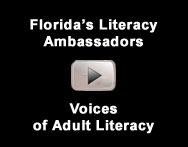|
Keynote Speaker:
 |
Brian J. Zikmund-Fisher, PhD
3 Questions to Think About Every Time We Give a Patient Numbers
Numbers are often communicated to patients without considering whether or why the patient actually needs them. In this session, Dr. Zikmund-Fisher will explore simple, yet powerful, questions to help health communicators design clear and useful health number communications.
|
|
Summit Schedule:
9:00 am - 10:00 am |
Opening General Session and Keynote Address |
10:15 am - 11:15 am |
Concurrent Sessions (3) |
11:30 am - 12:30 pm |
Concurrent Sessions |
12:45 pm - 1:30 pm |
Closing General Session / Small Group Discussions |
|
Promoting Health Literacy Through Interprofessional Communication
Jessica Daly, MSLIS
Head of Library Outreach & Marketing
AdventHealth University
Terri Johnson, MSLIS, AHIP
Medical Librarian
Florida State University
Charlotte Edwards Maguire Medical Library
Dr. Amy Blue, Ph.D.
Associate Vice President
Interprofessional Education
University of Florida
Explore key facets of improving health literacy in healthcare. Learn about training patients to communicate effectively, fostering partnerships in healthcare teams, teaching essential skills to medical students, and employing interprofessional communication strategies. Gain valuable insights into patient communication, medical education, and interprofessional collaboration for improved healthcare outcomes.
|
|
Health Education and Advocacy Through Storytelling
Scott Darius, Esq.
Executive Director
Florida Voices for Health
We'll explore the importance of sharing stories to communicate ideas and talk through practical tips to effectively tell and use stories.
|
|
Using ChatGPT for Plain Language Writing for Health Professions
Dr. Richard Zraick, Ph.D., CCC-SLP, CHSE
Professor, School of Communication Sciences & Disorders
University of Central Florida
Health literacy critically influences health outcomes. In the U.S., around one-third of adults read at an eighth-grade level or lower. To improve understanding, health information should be at a fifth-grade level using Plain Language. Clear comprehension fosters better communication with healthcare providers and proactive health steps. Our presentation demonstrates how ChatGPT can educate health professions students and clinicians about Plain Language writing effectively and ethically.
|
|
Patient Activation Model- A Resource for Your Patient Care Toolkit
Dr. Laura Guyer, Ph.D., MEd, RDN
Assoc. Director of Global Health Education Programs
University of Florida College of Medicine
‘Patient activation’ describes the degree to which individuals have the knowledge, skills and confidence to manage wellbeing and share responsibility for health decisions with providers. Health literate patients make better health decisions and are better able to navigate healthcare organizations. Most research has focused on patient literacy skills and provider communication. The research-validated Patient Activation Measure (PAM) assesses self-efficacy and attitudes and equips providers to engage in shared decision-making.
|
|
Providing Culturally Competent Care to Diverse Populations
Dr. Lisa Hamilton, Ph.D.
President
Florida Community Health Workers Coalition
Dr. Merlene Ramnon, Ph.D.
Program Director
Florida Department of Public Health
Kamia Brown
Senior Director of Healthcare Transformation
Sunshine Health
This panel brings together essential social sector stakeholders (health provider, plans, public health practitioner, and a community-based agency) to share their multi-faceted strategies on how partnerships and systemic methods align to provide culturally competent care to diverse populations.
|
|
Health Literacy and Patient Outcomes
Jessica Daly, MSLIS
PHead of Library Outreach & Marketing
AdventHealth University
In this session we'll increase our understanding of how low health literacy affects patient outcomes and discuss whose responsibility it is to improve health literacy in our community. We'll also explore the latest research and learn how to improve our own health literacy as well as the health literacy of others.
|
|












